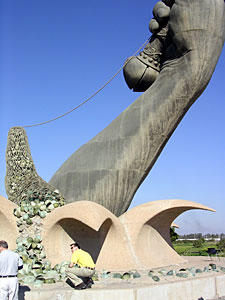Foreign Affairs
After the more immediate danger posed by Osama bin Laden's al Qaeda network has been dealt with, the Bush administration should indeed turn its attention to Baghdad. What it should do at that point, however, is pursue the one strategy that offers a way out of the impasse. The United States should invade Iraq, eliminate the present regime, and pave the way for a successor prepared to abide by its international commitments and live in peace with its neighbors. [Emphasis mine]Al Qaeda has been dealt with?! Whoo, that's a releif! Make sure we tell the people of Tunisia, Indonesia, Kenya, Morocco, Turkey, Spain, Egypt, Iraq, Afghanistan, and England that we've completely eradicated Al Qaeda's terrorist threat, because I'm sure they'd be glad to hear it. For those of you without the time to peruse each article, here is a concise timeline of events that prove Pollack wrong on this count. Further, there is a direct link between the motivation of the 7/7 London bombings and the Iraq war. Once again, this does not mean that the war should end tomorrow, but rather that a more prudent plan may have been advisable. Pollack himself seems to acknowledge this:
Hawks are wrong to think the problem is desperately urgent or connected to terrorism, but right to see the prospect of a nuclear-armed Saddam Hussein as so worrisome that it requires drastic action. [Emphasis mine]At any rate, the war in Iraq has done nothing to reduce the risk of terrorism to the U.S. (if anything, it serves as a breeding/training ground for new terrorist acts), and has compromised the nation's ability to defend itself from other crises as well (Hurricane Katrina comes to mind). Perhaps unilateral action was a bit too hasty, hmm?
At any rate, I can't afford the $5.95 to get through the rest of Pollack's defense of the Iraq war. But in the first five hundred words, he fails to assuage my concerns.





